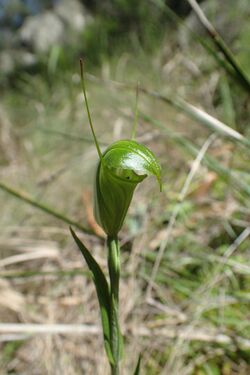Biology:Pterostylis obtusa
| Blunt-tongue greenhood | |
|---|---|

| |
| Pterostylis obtusa growing near Gara Gorge | |
| Scientific classification | |
| Kingdom: | Plantae |
| Clade: | Tracheophytes |
| Clade: | Angiosperms |
| Clade: | Monocots |
| Order: | Asparagales |
| Family: | Orchidaceae |
| Subfamily: | Orchidoideae |
| Tribe: | Cranichideae |
| Genus: | Pterostylis |
| Species: | P. obtusa
|
| Binomial name | |
| Pterostylis obtusa R.Br.[1]
| |
| Synonyms[1] | |
|
Diplodium obtusum (R.Br.) D.L.Jones & M.A.Clem. | |
Pterostylis obtusa, commonly known as the blunt-tongue greenhood, is a species of orchid endemic to New South Wales. It is distinguished from similar greenhood orchids by its thick, flat, platform-like sinus and blunt labellum which is only just visible above the sinus.
Description
Pterostylis obtusa has a rosette of between three and six dark green, egg-shaped, crinkled leaves, each leaf 12–25 mm (0.5–1 in) long and 10–15 mm (0.4–0.6 in) wide. A single shiny, bright green and white flower is borne on a flowering spike 150–250 mm (6–10 in) high. There are between three and five stem leaves on the flowering spike. The flowers are 20–28 mm (0.8–1 in) long and 10–12 mm (0.4–0.5 in) wide. The dorsal sepal curves forward in its upper half and has a thread-like tip about 4 mm (0.2 in) long. The edges of the petals are flared and the sinus is flat and platform-like with a rolled edge. The lateral sepals have thread-like tips 20–26 mm (0.8–1 in) long. The labellum is 9–11 mm (0.35–0.43 in) long, 3 mm (0.1 in) wide, green, blunt and is just visible above the sinus. Flowering occurs from February to June.[2][3]
Taxonomy and naming
Pterostylis obtusa was first described in 1810 by Robert Brown and the description was published in Prodromus Florae Novae Hollandiae et Insulae Van Diemen.[1][4] The specific epithet (obtusa) is a Latin word meaning "blunt" or "dull".[5]
Distribution and habitat
The blunt-tongue greenhood grows among grass in moist places on the ranges and tablelands of New South Wales and on Lord Howe Island.[2][3] Specimens from Tasmania are Pterostylis atrans.[6]
References
- ↑ 1.0 1.1 1.2 "Pterostylis obtusa". APNI. https://id.biodiversity.org.au/instance/apni/487983. Retrieved 26 April 2017.
- ↑ 2.0 2.1 Jones, David L. (2006). A complete guide to native orchids of Australia including the island territories. Frenchs Forest, N.S.W.: New Holland. p. 289. ISBN 978-1877069123.
- ↑ 3.0 3.1 Jones, David L.. "Pterostylis obtusa". Royal Botanic Garden Sydney: plantnet. http://plantnet.rbgsyd.nsw.gov.au/cgi-bin/NSWfl.pl?page=nswfl&lvl=sp&name=Pterostylis~obtusa. Retrieved 26 April 2017.
- ↑ Brown, Robert (1810). Prodromus florae Novae Hollandiae. London. p. 327. https://www.biodiversitylibrary.org/item/21771#page/197/mode/1up. Retrieved 26 April 2017.
- ↑ Brown, Roland Wilbur (1956). The Composition of Scientific Words. Washington, D.C.: Smithsonian Institution Press. p. 287.
- ↑ Jones, David L. (1998). "Contributions to Tasmanian Orchidology 7: A Taxonomic Review of Pterostylis in Tasmania". Australian Orchid Research 3: 160.
Wikidata ☰ Q15500078 entry
 |



